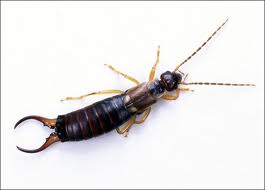While there is some dispute over the linguistic origin of the name "earwig" (see below), there's no disagreement among entomologists as to the veracity of the insect's fabled fondness for entering the human ear and boring into the brain, thereby causing insanity and/or death: it's balderdash.
Let's grant the experts their due. Insects do, on occasion, crawl into people's ears, but apart from varying degrees of discomfort and alarm they usually don't cause any great harm.
Experts have yet to reach a consensus on the etymology of the word earwig, however. Some sources (mainly older ones) say the name originated as an Old English phrase meaning "ear insect" or "ear creature," citing the old wives' tale as a direct inspiration. Others conjecture it's a corruption of the phrase "ear wing," referring to the ear-like shape of the insect's hind set of wings. Take your pick.
As to the origin of earwig superstitions, the Columbia Encyclopedia posits the following:
The superstition that earwigs crawl through the ears and into the brains of sleeping persons probably derives from their nocturnal habits and the tarry or waxy odor of a secretion of their abdominal glands.
Whether it's Ants, Bees, or any other exterminating issue, Assassin Exterminating will treat your home
as if it were our own. We understand that having pests in your home can be unsettling. That's why we
take the time to listen.
Assassin
Exterminating Provides Professional Pest Management Services The Way
It's Supposed To Be. That’s the difference when you “Always Hire A
Professional”.
Thank you for the visiting the Assassin
Exterminating & Pest Control Blog about Pest Control
and Exterminating Services in the North Texas area. If you
would like more information about a specific pest or service
please choose the appropriate link below and you will be
taken to the Assassin Exterminating & Pest Control web site or you can call us directly at: (817) 727-8149



